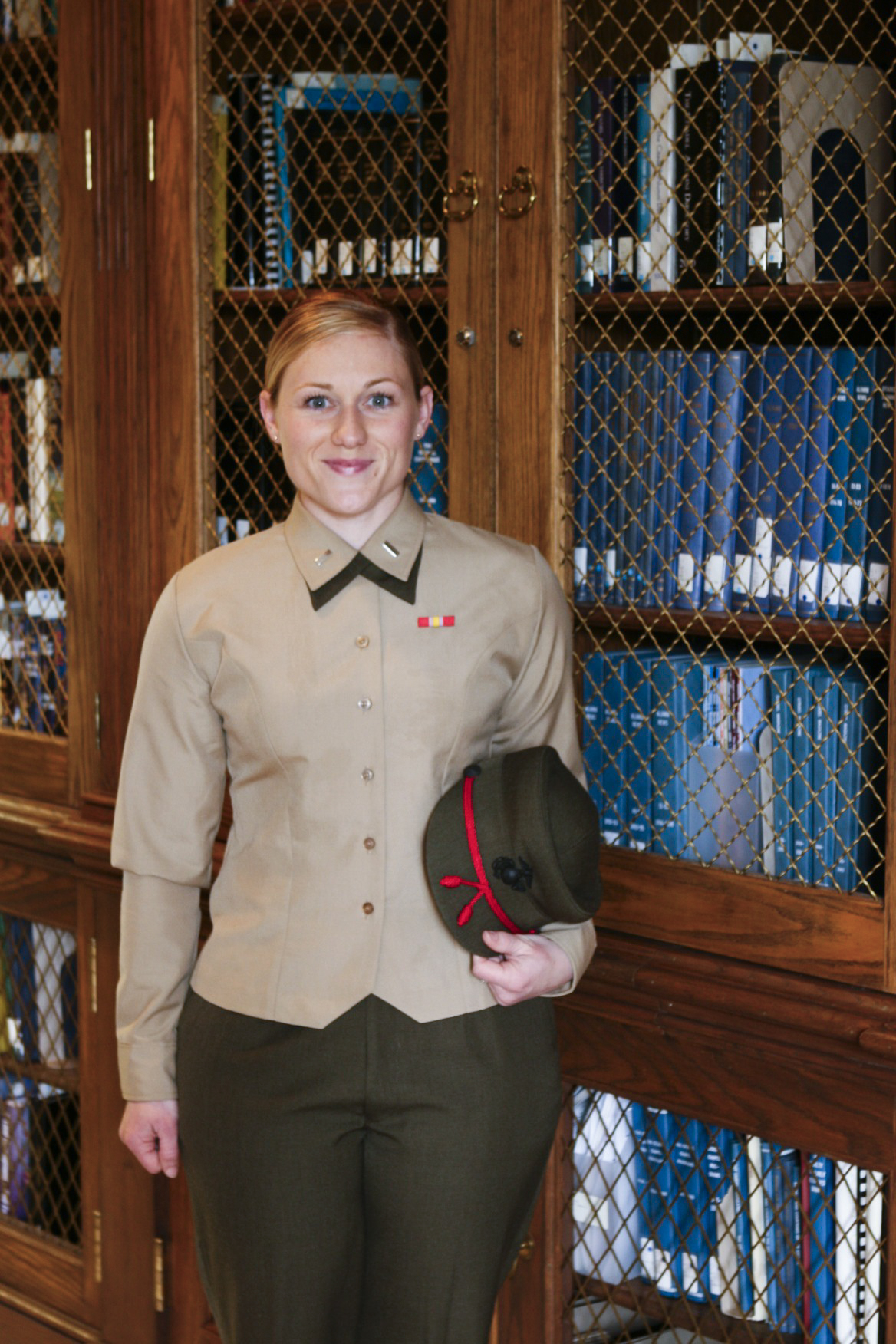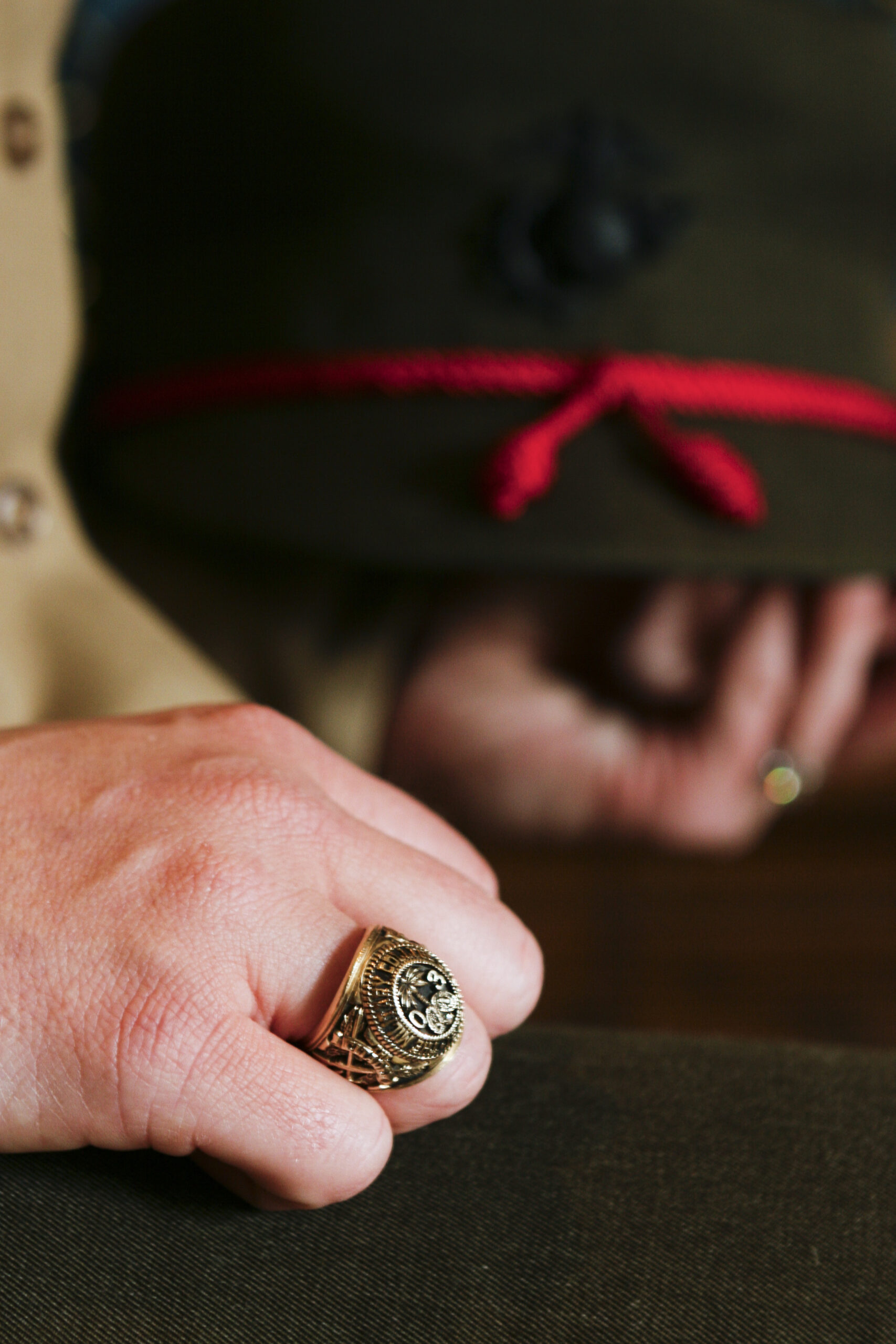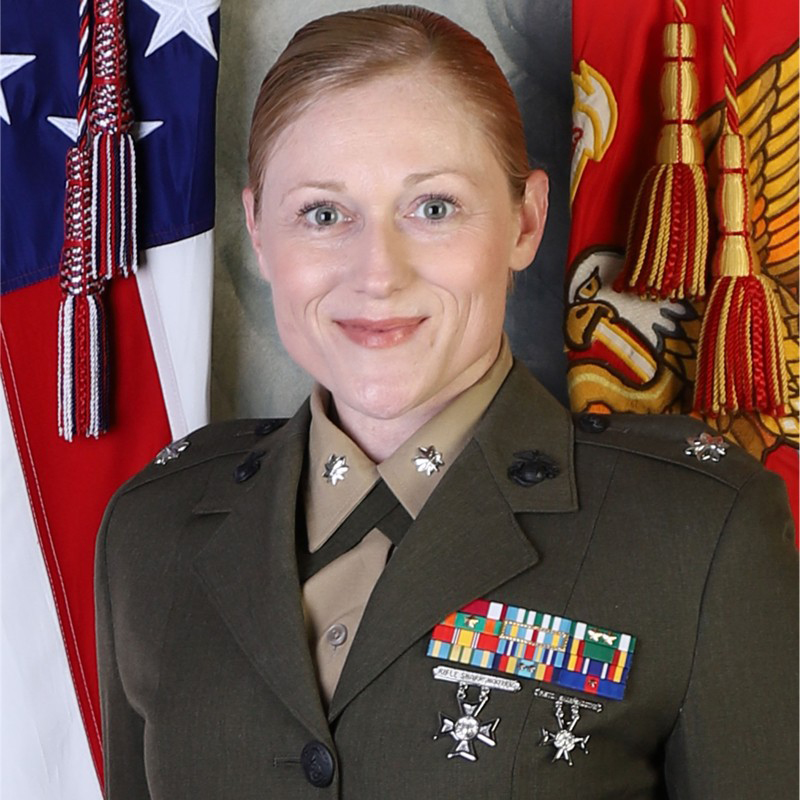2007
Originally published in The Citadel, 2007
A Florida beauty contestant applies to The Citadel on a whim and gets in. Why would she choose The Citadel and become one of the first 26 women to graduate, and why would she go on to become a Marine JAG?
When she was a little girl, 1st Lt. Nicole Villareal Bastian, ’02, lived in a light blue, three-bedroom stucco house in a working-class suburb of Tampa. With three sisters, a little brother, and a mutt named Freckles who had followed them home from the bus stop one day, it was a noisy and crowded house. In the drive sat a big station wagon that once had wooden panels, but her mother, who worked as a florist, used a hairdryer to melt them off, so the car was light blue like the house. Her father began his career as an enlisted Marine in the 1970s and later became a pilot for United Airlines.
By the time she was in high school, Bastian and her family had moved to a larger house in the Orlando area and traded in the station wagon for a van. Bastian was all over the place—she was the school mascot and a soccer player, she was on the debate team and in Junior ROTC and AP classes, and she competed in beauty pageants. It was while Bastian was in high school that the Supreme Court handed down its verdict to allow women to attend the Virginia Military Institute and The Citadel Board of Visitors subsequently voted to allow women into the Corps of Cadets. That was 1996. Bastian joined the Corps in 1999.
Today, on a Saturday afternoon, wearing jeans and a t-shirt, the petite blue-eyed blonde in the early weeks of pregnancy is hardly the image that comes to mind of The Citadel’s first female graduate to become a JAG officer. While on the surface her choice of colleges seems unusual, talking with Bastian, you learn that the 26-year-old is a strong- minded young woman who tackles everything she does with determination.
“I was looking at schools for soccer at the time,” said Bastian, who remembers listing The Citadel whimsically on her SAT. “I put down Chapel Hill and then I thought, well, I’ll put down The Citadel too… and then the brochures came from The Citadel, and my parents were really interested in it.”
Her parents were so interested in it that they paid her application fee.
“When I got the acceptance letter, my parents were actually sitting on the couch when I got home from school with the letter in hand, and they hadn’t done that with any of the other schools that I had gotten into.”
Their enthusiasm rubbed off on Bastian, and after a weekend trip to South Carolina, where she fell in love with Charleston and The Citadel, she joined the other freshman cadets matriculating in August.
Like her high school years, Bastian’s Citadel years were crammed with activity. She ran cross country and played soccer. She was on the color guard and a member of the rifle legion. She spent a semester studying in Florence, Italy, and she completed the physically demanding Bulldog Challenge.
“I liked it. I liked the class size. I liked what the school offered. I liked that you had a good student to-teacher ratio and that most of the professors on faculty had Ph.D.s, which you don’t find at most colleges. That’s a unique thing for a school, so it just fit. I liked the idea that it was going to be a challenge,” said Bastian. Three years after she joined the Corps of Cadets, Bastian, who began her college career with AP credits, graduated with a degree in political science. As a child growing up, Bastian had looked up to her grandfather, who had been one of the top admiralty lawyers in the nation, so she followed in his footsteps to law school.
“History, writing and English always fit,” she said. “I could bust out an essay with no problems, and I was really interested in politics, especially international politics, and the idea of doing international law was really appealing.”
When her grandmother, who lived in Tampa, invited Bastian to move in and offered to pay her tuition to Stetson University, a private school with a law campus in Tampa, Bastian jumped at the chance and moved back home to Florida. The year started out well. Bastian had fun and was making friends and enjoying the challenges of law school, but then her grandmother became very ill.
“I was her primary caretaker, and she ended up passing away in March of that year, and that was a lot to deal with. I went from having a free ride—a free place to stay and a pretty good lifestyle to not having a place to live, not having money for tuition and having awful grades, and I couldn’t transfer to a cheaper school because I didn’t have the academic credentials.”
It was during this tumultuous time that Bastian looked back to her Citadel experience. “A group project at law school had gone bad. People didn’t show up to work on the project, and I realized that I missed accountability. I missed uniforms. I missed the military lifestyle, so I started running, got into really good shape and signed up for a marathon.”


As she got into better physical shape, Bastian’s life began to take shape too. Her grades were back up in her second year of law school, and she decided to become a Marine Corps JAG officer. The Judge Advocate General’s Corps is an organization that spans all of the services, including the Army Reserve and the National Guard. The corps includes lawyers, legal administrators and specialists, court reporters, commissioned and warrant officers, enlisted personnel and civilians.
“What I like most about being a Marine Corps JAG is that you’re a Marine first. You’re not a lawyer in a uniform. You do all of the Marine Corps stuff. You go to OCS [Officer Candidate School] with everyone else for the entire time. You go to TBS [The Basic School] for six months. You learn how to fire a weapon, how to blow up everything and how to be a provisional rifle platoon commander,” said Bastian. Between her second and third years of law school, Bastian attended OCS for 10 weeks, graduating 11th in leadership out of a student body of more than 300 and winning the physical fitness award.
The history of the Judge Advocate General dates back to 1775, when Gen. George Washington asked the Continental Congress for a lawyer to assist with the courts-martial that were being carried out. Congress appointed William Tudor to do the job, and a new tradition was born. The Marine Corps has some 400 judge advocates serving full time. Judge advocates perform a variety of legal services: military justice, claims, legal assistance, administrative law, government ethics and environmental law. But today, in a time when the enemy holds no regard for the laws of war, JAGs are in greater demand than ever before. In Iraq, weapons are stored in hospitals, insurgents fire from mosques, tanks are parked next to schools and a man carrying a white flag might open fire on U.S. soldiers and Marines. Still, U.S. forces are expected to comply with the laws of war, and JAGs are being called upon to advise commanders.
Bastian is currently stationed at the U.S. Marine Corps Recruit Training Depot on Parris Island, S.C., where she serves as a battalion legal officer for some 500 active duty Marines. When one of the Marines in her battalion is accused of violating the Uniform Code of Military Justice, it is Bastian who investigates.
In addition to investigating the crime, Bastian must ensure that the accused Marine’s rights are not violated during the legal process, and it is also up to her as the battalion legal officer to appoint an officer to preside over the hearing. Bastian, in turn, advises the officer on how to properly conduct the summary court martial. An SCM conducted improperly could be a violation of the Marine’s rights.
Bastian also spends much of her time processing deserters—investigating the circumstances, making a case against the deserter, sending out a form similar to an arrest warrant, discovering the reasons for the desertion and advising the battalion commander about the level of court martial that the deserter should face. At the same time, she works with the military justice officers, who prosecute the case, to keep them abreast of the background and charges.
After she serves for a year as battalion legal officer, Bastian will be assigned to another legal position. She could be assigned to military justice to prosecute cases, to defense, to civil law or to family law.
“Since I am a Marine first and then a lawyer, I can also be assigned to fill any officer billet in the Marine Corps,” she said. “I would prefer to go to Military Justice to get more courtroom experience litigating cases or practicing family law. In law school my favorite class was trial advocacy, and this would give me an opportunity to use my trial advocacy skills as a prosecutor or a defense counsel.”
Bastian and her husband, Joe, are expecting their first child, a daughter, in January. Joe is a golf professional for the PGA, which makes it easy for him to find a job in most places that Bastian could be stationed, so their life together is planned around her assignments. Bastian takes her career seriously; like The Citadel, it has become a part of who she is.
“I wear the ring, so I have to hold myself in accordance with the standards that The Citadel expects of a graduate for the rest of my life. When you graduate law school and become a lawyer, you take an oath. The same goes for becoming a Marine Corps officer—you take an oath to defend the Constitution of the United States, and that’s just the level of responsibility. It adds and adds, and you have more and more to lose. You have more to fight for, and because of that, you have to conduct yourself in a more mature, more responsible way. The Citadel truly helped make me a better civilian and officer of my country.”
U.S. Marine Corps Lt. Col. Nicole Villareal Bastian is currently the 8th Battalion commander for U.S. Military Entrance Processing Command. She earned her bachelor’s degree from The Citadel, her juris doctor from Stetson University College of Law and her master’s degree from Marshall University. Her Marine Corps operational experience includes serving with the air wing, the ground combat element, and in joint deployed environments. She has served at supporting establishments in human resources and recruiting capacities. She commanded Recruiting Station St. Louis, putting thousands of new recruits and officers into the Marine Corps. She also serves as the District 9 Director for The Citadel Alumni Association.

